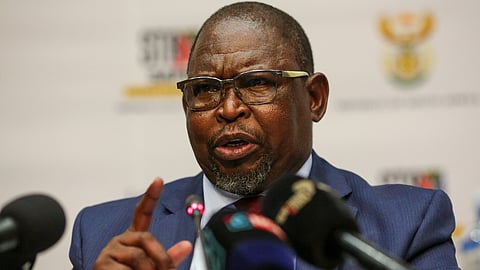South Africa scales back VAT hike in bid to end budget standoff
Key topics:
- South Africa proposes smaller VAT increase to resolve budget deadlock.
- Revised budget includes cuts in welfare grants and fewer tax bracket adjustments.
- Coalition tensions persist, with the DA opposing tax hikes without growth plans.
Sign up for your early morning brew of the BizNews Insider to keep you up to speed with the content that matters. The newsletter will land in your inbox at 5:30am weekdays. Register here.
Support South Africa's bastion of independent journalism, offering balanced insights on investments, business, and the political economy, by joining BizNews Premium. Register here.
If you prefer WhatsApp for updates, sign up to the BizNews channel here.
*By Ntando Thukwana and S'thembile Cele
South African Finance Minister Enoch Godongwana proposed scaling back consumption-tax increases and curbing spending in a bid to win support for the budget from the nation's fractious governing coalition after a previous iteration was shot down.
The National Treasury plans to raise value-added-tax by 0.5 percentage points in each of the next two fiscal years, which would bring the rate to 16%. The increment would be a partial climb-down from the 2 percentage-point increase for 2025-26 that was rejected three weeks ago, forcing the postponement of the budget speech and exposing deep rifts within President Cyril Ramaphosa's administration.
A so-called government of national unity was established after last year's elections failed to produce an outright winner, and disagreement over budget policy has proved a major test of its durability. The revised formulation was produced after three weeks of tense negotiations, and lawmakers will likely vote on whether to approve it in May after debates on the allocations to the various government departments and entities.
The African National Congress, which held a parliamentary majority for three decades after apartheid ended in 1994, was itself conflicted over the sharp VAT increase and indicated its willingness to compromise over the levy. The Democratic Alliance, the second-largest party, said it will only back the new budget if it included spending cuts and underpinned faster economic growth.
The DA won't support the budget in its current form, party leader John Steenhuisen said on Wednesday shortly before Godongwana presented the document in parliament. Mark Burke, the DA's finance spokesman, earlier said the party remains opposed to tax increases.
An additional 75 billion rand ($4.1 billion) in revenue should be generated over the next three fiscal years if the VAT increase is approved, the Treasury said in its budget review, significantly less than the 191 billion rand it expected to garner from the bigger hike. It intends covering the shortfall by reducing budgetary allocations for welfare grants and the Home Affairs Department, digging into the nation's contingency reserves and not adjusting tax brackets to account for inflation.
More food items will be exempted from VAT, fuel levies will be left unchanged and welfare-grant recipients will be given inflation-beating increases to shield the poor from the impact of higher taxes. Even so, the additional three-year budget for the stipends was cut by 15.1 billion rand compared with last month's provision.
The erosion of the contingency reserves would limit the government's ability to respond to economic shocks, such as US President Donald Trump's recent decision to cut aid to South Africa.
"The space and the room to deal with unforeseen and unavoidable pressures is much smaller," said Edgar Sishi, head of the Treasury's budget office. Using the reserves "reduces the buffers that otherwise would be there to deal with emergencies, and that could include things like disasters" and the loss of aid and other funding, he said.
Trump's assault on South Africa's land-expropriation and foreign policies was flagged among the risks to the Treasury's forecasts, and it expressed concern about escalating protectionist measures and geopolitical tensions.
The Treasury plans to raise 582 billion rand in 2025-26, marginally more than it envisaged last month, but still sees the debt-to-gross domestic product ratio peaking in that fiscal year at 76.2%.
The budget deficit is seen narrowing to 3.5% in 2027-2026, from 4.6% in the next fiscal years, and the economy is expected to expand by an annual average of 1.8% over the next three years.
Read also:
© 2025 Bloomberg L.P.

